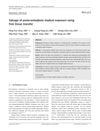 January 2018 in “Journal of translational science”
January 2018 in “Journal of translational science” Eating alfalfa sprouts every day can raise testosterone levels in middle-aged men, but broccoli sprouts don't have this effect.
 3 citations,
May 2022 in “The journal of investigative dermatology/Journal of investigative dermatology”
3 citations,
May 2022 in “The journal of investigative dermatology/Journal of investigative dermatology” Skin lesions in Carney Complex are caused by a gene change in some skin cells that leads to increased pigmentation and may lead to tumors.
 6 citations,
October 1993 in “Endocrinology”
6 citations,
October 1993 in “Endocrinology” Finasteride blocks progesterone production in specific tumor cells, potentially causing side effects.
 September 2019 in “Journal of Investigative Dermatology”
September 2019 in “Journal of Investigative Dermatology” Different staff in a dermatology clinic understand mostly their own tasks, not the full clinic process.
 138 citations,
June 2019 in “Stem Cells and Development”
138 citations,
June 2019 in “Stem Cells and Development” Periodontal ligament stem cells show promise for regrowing tissues but require more research for safe, effective use.
 24 citations,
January 2008 in “KARGER eBooks”
24 citations,
January 2008 in “KARGER eBooks” The document concludes that ongoing research using animal models is crucial for better understanding and treating Alopecia Areata.
9 citations,
September 2019 in “Journal of clinical sleep medicine” Vitamin B12 deficiency can rarely cause excessive daytime sleepiness.
 55 citations,
December 2006 in “Journal of The American Academy of Dermatology”
55 citations,
December 2006 in “Journal of The American Academy of Dermatology” Antidepressants called SSRIs can cause skin problems, bleeding risk, and other side effects.
 67 citations,
January 2007 in “Climacteric”
67 citations,
January 2007 in “Climacteric” Estrogens and SERMs can help with skin aging, but their safety and effectiveness need more research.
 13 citations,
July 1996 in “Annals of Internal Medicine”
13 citations,
July 1996 in “Annals of Internal Medicine” International medical graduates outperformed U.S. graduates on an internal medicine exam.
 July 1996 in “Annals of Internal Medicine”
July 1996 in “Annals of Internal Medicine” International medical graduates scored higher than U.S. graduates on a medical exam.
 13 citations,
July 1996 in “Annals of Internal Medicine”
13 citations,
July 1996 in “Annals of Internal Medicine” International medical graduates outperformed U.S. graduates on an internal medicine exam.
 July 1996 in “Annals of Internal Medicine”
July 1996 in “Annals of Internal Medicine” In 1995, international medical graduates did better than U.S. graduates on a medical exam.
 8 citations,
July 1996 in “Annals of Internal Medicine”
8 citations,
July 1996 in “Annals of Internal Medicine” Itraconazole may cause low platelet and white blood cell counts.
 June 1996 in “Irish Journal of Medical Science (1971 -)”
June 1996 in “Irish Journal of Medical Science (1971 -)” The document summarizes medical findings on topics like heart rhythm treatment, sleep apnea therapy, and various health conditions and treatments.
 18 citations,
November 2007 in “Annals of Surgery”
18 citations,
November 2007 in “Annals of Surgery” Finasteride reduces inflammation and improves immune response after trauma by altering hormone levels.
 18 citations,
May 2017 in “Head & Neck”
18 citations,
May 2017 in “Head & Neck” Free tissue transfer is highly effective for fixing exposed implants after skull surgery.
 9 citations,
January 2014 in “DARU Journal of Pharmaceutical Sciences”
9 citations,
January 2014 in “DARU Journal of Pharmaceutical Sciences” Cuscuta reflexa extracts helped regrow hair in rats with drug-induced hair loss.
99 citations,
September 2007 in “The American journal of pathology” Chemotherapy damages hair follicles, causing hair loss and other cellular changes.
 42 citations,
February 2014 in “Stem Cells and Development”
42 citations,
February 2014 in “Stem Cells and Development” Vitamin C helps adipose-derived stem cells grow and may support hair growth.
 2 citations,
February 2014 in “Animal Biotechnology”
2 citations,
February 2014 in “Animal Biotechnology” The PTGER2 gene is highly active in Cashmere goat skin and its activity changes with the hair growth cycle.
 64 citations,
March 2005 in “Journal of Investigative Dermatology”
64 citations,
March 2005 in “Journal of Investigative Dermatology” Brain-Derived Neurotrophic Factor (BDNF) slows down hair growth and promotes hair follicle regression.
March 2024 in “American journal of veterinary research” Clippers are the best tool for collecting dog hair for chemical tests, being fast and stress-free for the dog.
 January 2024 in “Journal of tissue engineering”
January 2024 in “Journal of tissue engineering” Sunlight exposure damages hair follicles, but certain stem cell-derived particles can reduce this damage and help with hair regeneration.
 10 citations,
August 2020 in “Indian Journal of Plastic Surgery/Indian journal of plastic surgery”
10 citations,
August 2020 in “Indian Journal of Plastic Surgery/Indian journal of plastic surgery” Hyaluronic acid filler injections are a favored non-surgical method to improve facial aging signs due to their convenience, effectiveness, and durability.
 July 2021 in “IntechOpen eBooks”
July 2021 in “IntechOpen eBooks” Ginseng, especially its component ginsenosides, can promote hair growth, reduce hair loss, and potentially treat conditions like alopecia by affecting cell pathways and cytokines.
 50 citations,
May 2004 in “Journal der Deutschen Dermatologischen Gesellschaft”
50 citations,
May 2004 in “Journal der Deutschen Dermatologischen Gesellschaft” Estrogens generally inhibit hair growth and improve skin quality, but their exact effects on hair follicles are complex and not fully understood.
 2 citations,
January 2004 in “Elsevier eBooks”
2 citations,
January 2004 in “Elsevier eBooks” Lupus affects the skin in various ways, and proper skin examination is crucial for diagnosis and treatment.
 5 citations,
August 2003 in “British Journal of Dermatology”
5 citations,
August 2003 in “British Journal of Dermatology” Iron deficiency might contribute to hair loss in women.
 1 citations,
January 2022
1 citations,
January 2022 Myo-inositol and D-chiro-inositol improve hormonal and physical symptoms in teenage girls with PCOS.


























